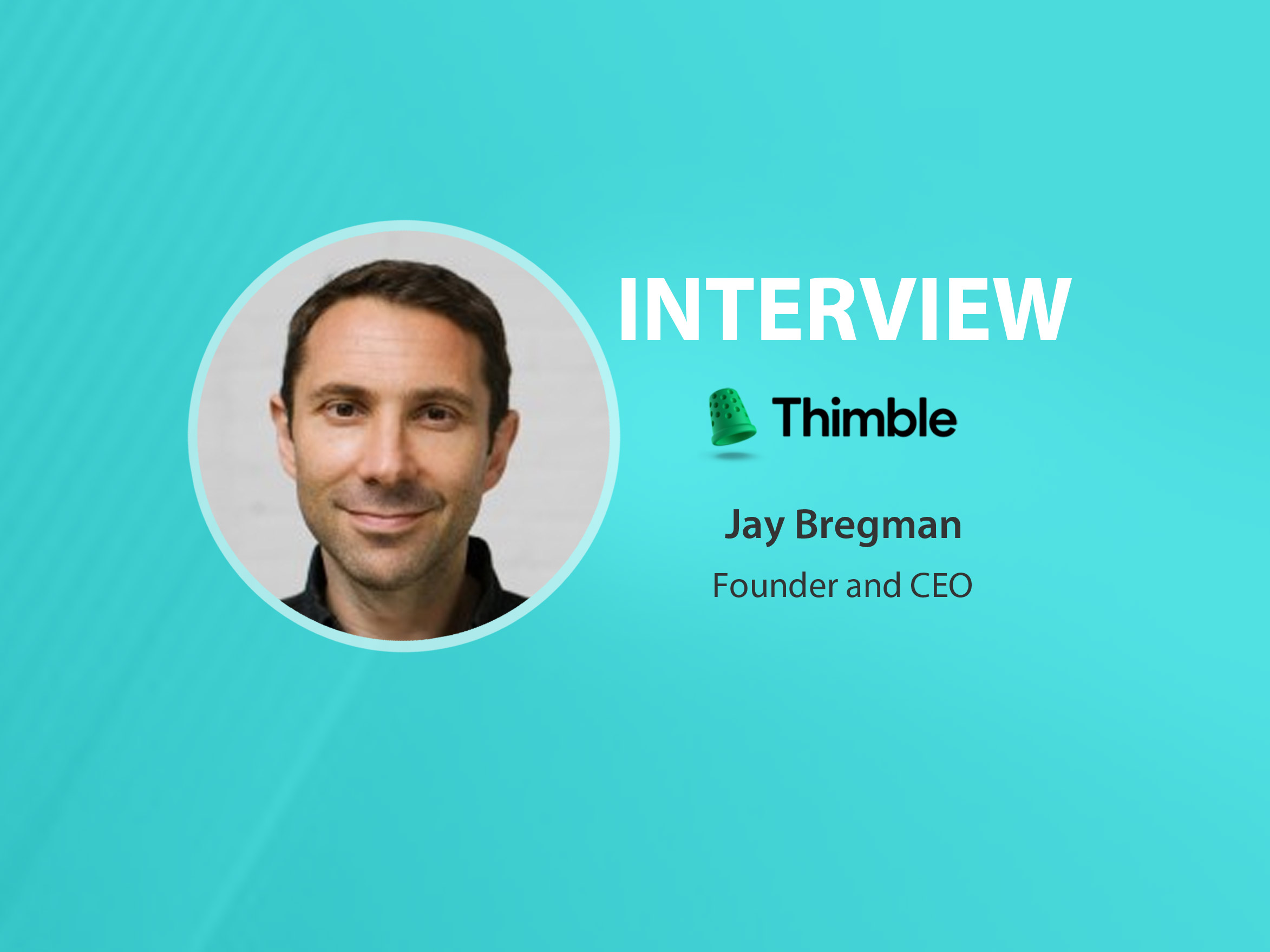Jay Bregman, Founder and CEO at Thimble joins us in this chat to talk about the idea behind Thimble and how the platform helps bring users a Netflix-like experience when it comes to buying insurance:
____
Tell us a little about yourself Jay, and the idea behind Thimble?
I’ve been in the startup world for quite some time now. The first company I founded was called eCourier, which used handheld computers for courier companies to unlock real-time automated dispatch. After that, I founded a London-based ridesharing company called Hailo, which was acquired by Daimler in 2016. To me, getting involved in markets when there’s so much room for innovation and growth is the key, and that’s one of the reasons why I love insurance and what we’re doing at Thimble now.
The insurance industry by-and-large has simply not caught up with the times. Time-consuming, archaic processes are typically in place, with coverage options limited to binding, longer-term policies. After conducting hundreds of conversations with SMBs and freelance workers, these issues were only made clearer. Simply put, there was an urgent need for a more flexible alternative solution that could adapt to a businesses’ needs at various stages of the growth cycle. Our mission at Thimble is to make insurance simple, to help businesses succeed on their own terms. We do this by bringing the Netflix experience to insurance: 3 questions to start, and coverage can be scaled, paused or cancelled instantly.
Read More: GlobalFintechSeries Interview with Joshua Levin, Co-founder at OpenInvest
We’d love to hear your observations on how you’ve seen the insurance sector (and insurtech) evolve in 2020 in the midst of the pandemic?
One top of mind issue that has emerged in the industry is around business interruption coverage. Insurers are now in an impossible bind: Pay out one virus-related claim and be forced to pay them all (think hundreds of billions of dollars), or don’t pay anyone and face a reputational backlash that could last decades. Without real structural change, we will just be condemned to repeat the cycle the next time there is a national disaster—just when businesses need the insurance industry the most. It doesn’t have to be this way. Technology, and a not-unprecedented federal backstop, could form the foundations of the next generation of economic stimulus led by the insurance industry. I think one thing that has become even clearer is that modern day entrepreneurs need more efficient and flexible business insurance policies. The business landscape as a whole has dramatically changed, and so it’s the job of the insurance providers and agents to ensure they are meeting these new set of needs to help their customers succeed.
What are some of the biggest long term changes to the insurtech and insurance marketplace that you feel will become more permanent as a result of this pandemic?
It has to be about building a better product to help SMBs succeed, and a large part of this is bringing the aforementioned speedy, flexible, and efficient policies that the modern business owner needs in order to survive and successfully navigate the current economic climate. For smaller players like us, this is the moment we can break into the mold and address those gaps with newer, more industry-forward ideas.
In what ways do you feel business owners (small / mid-size businesses) can ensure longevity with the right insurance and investments: what top tips would you share?
My top tips for longevity, particularly when navigating a crisis, would be the following:
Focus on building loyal customer relationships, both with new and existing customers. Make room for 1-1 conversations where possible to obtain the closest understanding of their needs.
Keep calm and maximize your clarity. In times of disaster, there is a huge premium on both capital and clarity. The capital you have available may be beyond your control, based on where your business happens to be in the funding cycle when the world tweaks. But clarity is always in your control. Use it wisely.
Diversify your investments; invest in different areas that would each react differently to the same event.
We’d love to hear your thoughts on the global fintech and insurtech startup marketplace- can you talk about some interesting innovations you’ve come across? Your thoughts on a few startups that you feel are set to turn into fintech / insurtech unicorns in the new future?
Lemonade is doing great work in the insurtech space. I think looking at the industry at-large, what we’re seeing is that more startups are moving away from being mere distributors of existing products and are instead creating these radically new products that fundamentally change the customer or broker experience.
As global fintech trends change and the market shifts due to business environments (and also Covid-19), what are your comments on the state of fintech in 2021 and beyond?
In 2021 and beyond, I predict that the fintech industry will continue to grow at the rapid rate we are already witnessing. Further, more and more industries are adopting a “digital imperative” mindset, where players are recognizing the importance of adopting modern, digital-first solutions in order to not only keep up with the times, but also allow themselves to most efficiently navigate times of great uncertainty. The insurance industry is no exception.
If anything, the COVID-19 pandemic has highlighted the gaps that exist within the fintech space, so in the future I expect there to be more innovative, forward-thinking startups who will be entering and helping to move the entire industry forward.
We’d love to hear about some of Thimble’s upcoming plans?
When I think back to why I started Thimble, it all started with the idea of making insurance just as easy to buy as a movie theater ticket. The goal was to streamline the entire process and to find a practical solution for those that found complicated, annual insurance policies difficult to navigate. We started with one type of business, one defined problem and built on top of that to now provide insurance for hundreds of different types of businesses, with all the complexities they entail.
Read More: GlobalFintechSeries Interview with Irwin Grossman, CEO and Co-founder at Delta Payment Solutions
Moving forward, we only plan to continue building on top of this progress in our ongoing commitment to helping small businesses succeed, particularly during this difficult time. One current step we are taking is our partnership with Lloyd’s to help develop a new form of parametric business interruption insurance, to protect companies from pandemic losses. Our goal with the solution is to have it act as a “first line of defense” that pays SMBs immediately if specific criteria are met — essentially providing an “instant stimulus” while governments figure out the rest.
Jay Bregman is the Founder and CEO at Thimble
Building Sales Resilience, Driving Impact and Ensuring Success in 2021: Catch more from these episodes of the SalesStar Podcast:

